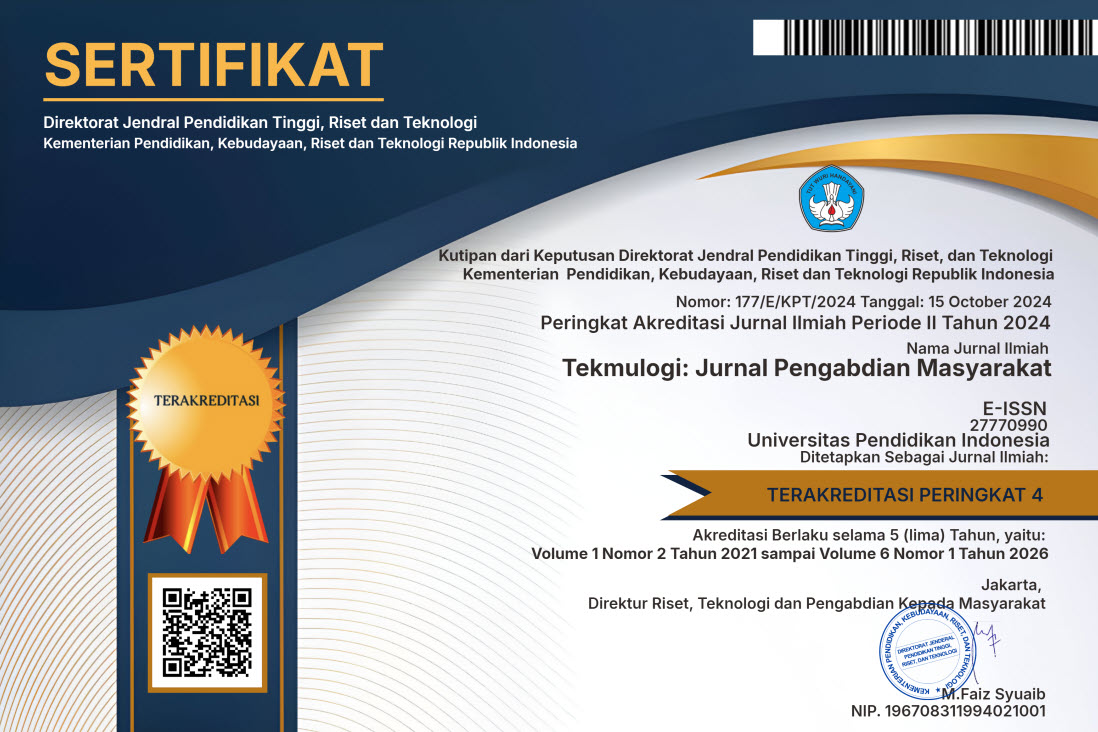Edukasi berlogika di era digital bagi masyarakat
Abstract
Keywords
Full Text:
PDFReferences
Afif, N. (2019). Pengajaran dan pembelajaran di era digital. IQ (Ilmu Al-qur'an): Jurnal Pendidikan Islam, 2(01), 117-129.
Ahmad, M. I. H. (2012). Signifikansi memahami logika dasar. Jurnal Substantia, 14(1), 37-44.
Ariyanti, L.S., and Nandiyanto, A.B.D. (2022). Distance teaching of stress materials to junior high school students using digital media. ASEAN Journal of Community Service and Education, 1(1), 7-14
Asrobuanam, S., & Sumaji, S. (2021). Peran logika dalam berpikir kritis. JURNAL SILOGISME: Kajian Ilmu Matematika dan Pembelajarannya, 5(2), 84-94.
Athanassiou, N., McNett, J. M., & Harvey, C. (2003). Critical thinking in the management classroom: Bloom's taxonomy as a learning tool. Journal of Management Education, 27(5), 533-555.
Eshet, Y. (2012). Thinking in the digital era: a revised model for digital literacy. Issues in informing science and information technology, 9(2), 267-276.
Fitriarti, E. A. (2019). Urgensi literasi digital dalam menangkal hoax informasi kesehatan di era digital. Metacommunication; Journal of Communication Studies, 4(2), 234-246.
Habibah, U., Hasibuan, R., & Setyowati, S. (2021). Keefektifan literasi digital untuk meningkatkan kemampuan berpikir logis dan mengungkapkan bahasa anak. Jurnal Pelita PAUD, 6(1), 81-91.
Haeniah, N. (2019). Logika Dalam Pembelajaran. JURNALISTRENDI: Jurnal Linguistik, Sastra, dan Pendidikan, 4(1), 300-308.
Hendriyana, H., Fuada, S., Sutisna, M. R., Pradeka, D., & Taufik, M. (2022). Optimalisasi digital marketing instagram sebagai channeling di lingkungan mahasiswa upi kampus cibiru. J-ABDIPAMAS (Jurnal Pengabdian Kepada Masyarakat), 6(1), 17-26.
Heryadi, D. (2016). Menumbuhkan karakter akademik dalam perkuliahan berbasis logika. Jurnal Pendidikan dan Kebudayaan, 1(3), 317-330.
Indriani, R., & Yemmardotillah, M. (2021). Literasi digital bagi keluarga milenial dalam mendidik anak di era digital. Continuous Education: Journal of Science and Research, 2(2), 1-13.
Mustofa, R. F., & Hidayah, Y. R. (2020). The Effect of Problem-Based Learning on Lateral Thinking Skills. International Journal of Instruction, 13(1), 463-474.
Nurlita, A. A. Development of Digital-Based Interactive Teaching Materials in Draping Courses. Indonesian Journal of Teaching in Science, 3(1), 97-104.
Rahmawati, A., & Senen, A. (2021). Pengembangan Media Convertible Book Berbasis Scientific Approach Untuk Meningkatkan Pemahaman Konsep dan Karakter Peduli Lingkungan. Scholaria: Jurnal Pendidikan dan Kebudayaan, 11(2), 179-187.
Reskianissa, A., Sakti, A.W., and Azizah, N.N. (2022). TikTok platform to train middle school students' computational thinking skills in distance learning. ASEAN Journal of Educational Research and Technology, 1(1), 79-86.
Tiong, G.H., and Bakar, A.Y.A. (2022). The engagement of critical and creative thinking activities in the teaching and learning process. ASEAN Journal of Educational Research and Technology, 1(2), 139-146.
Vraga, E. K., Kim, S. C., & Cook, J. (2019). Testing logic-based and humor-based corrections for science, health, and political misinformation on social media. Journal of Broadcasting & Electronic Media, 63(3), 393-414.
Wahyuddin, W., Satriani, S., & Asfar, F. (2021). Analisis kemampuan menyelesaikan soal high order thinking skills ditinjau dari kemampuan berpikir logis. AKSIOMA: Jurnal Program Studi Pendidikan Matematika, 10(2), 521-535.
Yuniarto, B., & Yudha, R. P. (2021). Literasi digital sebagai penguatan pendidikan karakter menuju era society 5.0. Edueksos: Jurnal Pendidikan Sosial dan Ekonomi, 10(2), 176-194
DOI: https://doi.org/10.17509/tmg.v2i2.50477
Refbacks
- There are currently no refbacks.

This work is licensed under a Creative Commons Attribution-ShareAlike 4.0 International License.
Tekmulogi: Jurnal Pengabdian Masyarakat,
(e-ISSN:2777-0990 | p-ISSN:2777-1199) published by Universitas Pendidikan Indonesia, Kampus UPI di Cibiru.
Indexed by.





